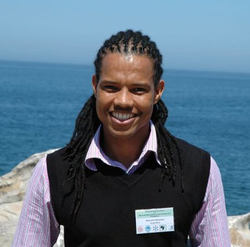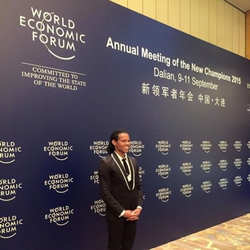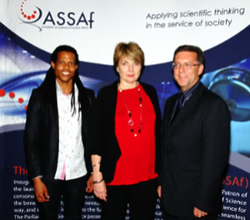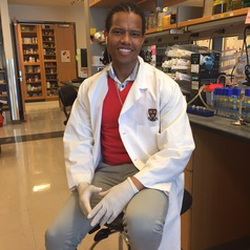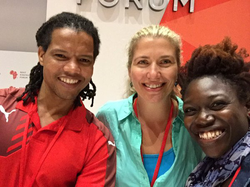Mohlopheni Jackson Marakalala
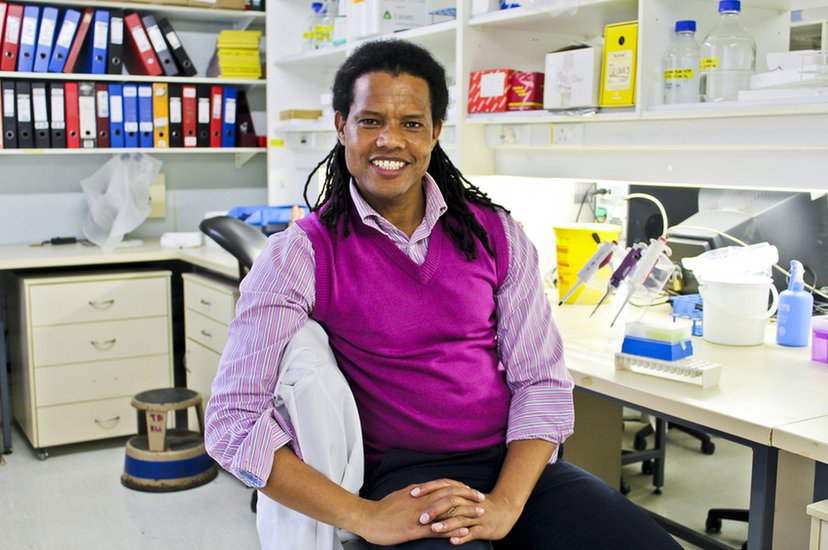
Mohlopheni Jackson Marakalala
Mohlopheni Jackson Marakalala is a South African senior lecturer at the University of Cape Town and a visiting scientist at Harvard University. [1]
Early life and education
Secondary school years
Marakalala was born in Mokopane, South Africa. He attended Masodi High School in Mahwelereng, a township 2 kilometers from Mokopane. Regarding mixed schools after the abolishment of apartheid, Marakalala thought that "it was an opportunity but... it was [still] for those who could afford [attending the school]". He added that "there were still processes involved on how the inclusion itself would actually include everyone". He graduated from Masodi High School in 1997.
Undergraduate years
The desire to find a cure to HIV/AIDS sparked Marakalala's interest in science [12]. In 1998, Marakalala was enrolled in the University of the North, receiving his B.S. in biochemistry and microbiology in 2002. He then received his honours degree in 2003 from the University of Limpopo, which resulted from the merger of the University of the North and Medical University of South Africa.
Graduate years
Marakalala, a Canon Collins Scholar, then attended the University of Cape Town in 2004 to initially obtain a MSc., which was later upgraded to a PhD in 2006. ** In 2008, he received a PhD in clinical pathology and won the Bronte-Stewart Research Award, which is given to the student with the most meritorious doctoral thesis. His thesis looked into the possibility of inhibiting mycothiol biosynthesis and the mycothiol-dependent detoxification pathway to create drugs that can combat tuberculosis.
Career
2008-2012
After finishing his doctoral degree, Marakalala became a postdoctoral researcher for the Institute of Infectious Disease and Molecular Medicine, focusing on the immunology of Tuberculosis and fungal infections and the role of Dectin-1 in their innate immunity [1]. He was under the mentorship of Dr. Gordon Brown. In 2010, Marakalala was awarded the Sydney Brenner Fellowship, an award given to young scientists conducting research in South Africa. In 2012, Marakalala was the representative for South Africa at the Lindau Nobel Laureate Meeting in Germany. During the meeting, he participated in a panel discussion about the role of science in the developing world.
2012-present
After finishing postdoctoral research for the Institute of Infectious Disease and Molecular Medicine in 2012, Marakalala then attended Harvard University for another postdoctoral research position.
During his time at Harvard, Marakalala specialized in tuberculosis granulomadevelopment and mycobacterial molecular genetics [1]. In 2013, he was appointed as the secretary for Harvard School of Public Health Postdoctoral Association. He was also a member of the Dean's Advisory Committee on Diversity and Inclusion at the Harvard School of Public Health in the same year. In the following year, Marakalala went to Kocaeli University in Turkey under a fellowship program [1]. Marakalala was also involved in the Commonwealth Science Conference, an event that aimed to solve problems in Commonwealth countries using science.
In 2015, Marakalala was one of the fifteen Africans selected for the Next Einstein Forum Fellowship, which recognized Africa's most outstanding scientists and technologists [1]. In the same year, He was also named a Young Scientist at the World Economic Forum's New Champions gathering in China [1]. He also attended the 2015 Commonwealth Day reception, where he met Queen Elizabeth II and the Duke of Edinburgh.
After doing postdoctoral research at Harvard, Marakalala returned to South Africa to become a senior lecturer at the University of Cape Town [1].
Selected Works:
Green, V. A., Munshi, S. U., Marakalala, M. J., & Mourao, M. M. (2010).
Molecular mechanisms of viral infection and propagation: An overview of the second Advanced Summer School in Africa.*IUBMB Life,*62 (8), 573-583. doi:10.1002/iub.364
Strasser, D., Neumann, K., Bergmann, H., Marakalala, M. J., Guler, R., Rojowksa, A.,...
Ruland, J. (2012).
Syk kinase-coupled C-type lectin receptors engage protein kinase C-δ to elicit Card9 adaptor-mediated innate immunity.*Immunity,*36 (1), 32-42. doi:10.1016/j.immuni.2011.11.015
Broadley, S. G., Gumbart, J. C., Weber, B. W., Marakalala, M. J., Steenkamp, D. J., & Sewell, B. T. (2012).
A new crystal form of MshB from Mycobacterium tuberculosis with glycerol and acetate in the active site suggests the catalytic mechanism.*Acta Crystallographica section D: Biological Crystallography,*68 (11), 1450-1459. doi:10.1107/S090744491203449X
Marakalala, M. J., Williams, D. L., Hoving, J. C., Engstad, R. E., Netea, M. G., & Brown, G. D. (2013).
Dectin-1 plays a redundant role in the immunomodulatory activities of β-glucan-rich ligands in vivo.*Microbes and Infection,*15 (6), 511-515. doi:10.1016/j.micinf.2013.03.002
Mavrici, D., Marakalala, M. J., Holton, J. M., Prigozhin, D. M., Gee, C. L., Zhang, Y. J.,...
Alber, T. (2014).
Mycobacterium tuberculosis FtsX extracellular domain activates the peptidoglycan hydrolase, RipC.*Proceedings of the National Academy of Sciences,*111 (22), 8037-8042. doi:10.1073/pnas.1321812111
Marakalala, M. J., Raju, R. R., Sharma, K., Zhang, Y. J., Eugenin, E. A., Prideaux, B.,...
Rubin, E. J. (2016).
Inflammatory signaling in human Tuberculosis granulomas is spatially organized.*Nature Medicine,*22 (5), 531. doi: 10.1038/nm.4073
